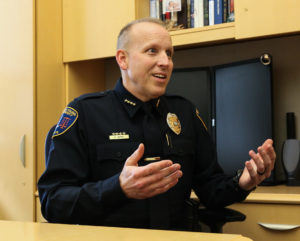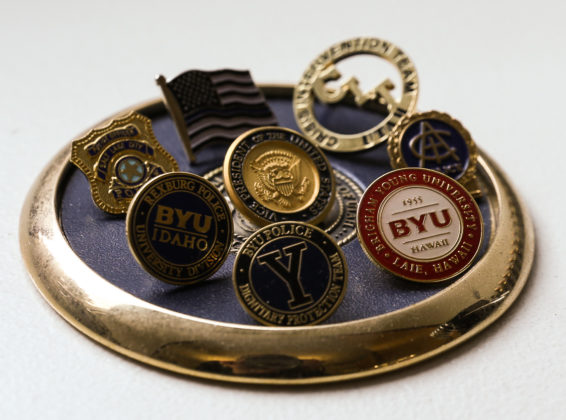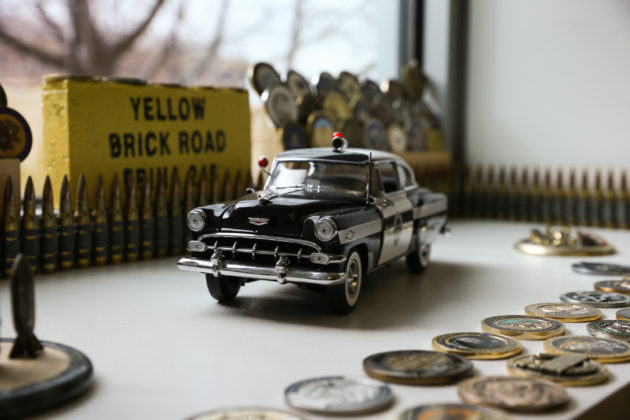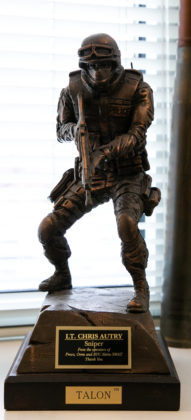BYU Police Chief Chris Autry’s office windowsill is covered in coins.
Not monetary coins; rather, they’re “challenge coins,” which Autry said agencies such as police departments and military units exchange as signs of appreciation and respect.

However, Autry likely wasn’t planning on one particular challenge when he became BYU’s new police chief in January: a Feb. 20 letter addressed to President Kevin J Worthen announcing plans by the Utah Commissioner of Public Safety to decertify BYU’s University Police, effective Sept. 1. The letter says the department failed to conduct an internal investigation into allegations of misconduct and failed to comply with a subpoena for internal records.
BYU is appealing the decision and released a statement saying the university finds the ground for appeal “confounding” and disagrees with the grounds for seeking decertification. It also states BYU believes University Police met all applicable criteria and is surprised the commissioner issued the letter “on these technical grounds.”
However, BYU attorney Heather Gunnarson later said, “We agree that University Police should be subject to the same level of transparency and accountability as any other law enforcement office within the state.”
The Utah House voted March 12 to pass a bill requiring private campus police organizations — including BYU’s — to follow the same public records rules adhered to by all other public police agencies.
The Daily Universe interviewed BYU Police Chief Chris Autry about his career prior to the decertifcation announcement, and Autry has since not returned requests for comment on the matter.
However, during a Senate committee hearing about the bill, he stated, “University Police supports Senate Bill 197, which would make the documents of law enforcement actions more accessible to the public through the Government Records and Management Act. We have no issue with being held to the same government requirements as other law enforcement agencies.”
University spokesperson Carri Jenkins said in the coming months, University Police will continue operating as a state-certified police force.
“For nearly 40 years, BYU has protected its students and campus community, one of the largest concentrations of citizens in the state of Utah, through a state-certified police force,” she said. “We believe that this is the best proven means of protecting our students and campus community.”
Becoming police chief
Autry was born and raised in Georgia and decided to stay in Utah after serving a mission in Salt Lake City.
He attended BYU and initially majored in mechanical engineering, but “really wasn’t having fun with it,” so he switched to something still challenging but which he enjoyed more: recreation management and youth leadership, which allowed him to go camping and boating, learn games and help teach an outdoor survival course.
Autry became interested in police work because he wanted a career that was different every day, would challenge him and would allow him to help people. He enrolled in the police academy while finishing his bachelor’s degree and graduated from both the police academy and BYU in 1997. Though he wasn’t sure at first that he wanted to do police work, he liked it after getting into it.
Autry’s first police job was with the Midvale Police Department, but soon he began feeling like he needed a graduate degree. By then he was married, and Autry and his wife decided BYU would be a good place for him since he could get his degree for free while working as a police officer on campus.
He joined BYU’s University Police in 1997 and almost immediately following that was also hired part-time by the Provo Police Department, where he continued working part-time for three and a half years. Because of his connections with the Provo Police Department, he was able to help expand the Utah County Metro SWAT team, which he said includes the BYU, Provo, Orem and UVU Police Departments.
Autry worked on his master’s of public administration degree from 2000 to 2002, intending to work for the FBI after. Following the completion of his master’s degree, he attended the three-month long FBI National Academy in Quantico, Virginia, where he took classes on topics like cybercrime and forensics, and where he networked with department heads, high-ranking law enforcement officials and people from other agencies.
However, it was there he met FBI agents who showed him the FBI is not like what people see on TV, an experience that helped him realize how good he had it with the University Police. Autry decided to stay put and “got promoted pretty quick.” He remained involved with the Metro SWAT team for 10 years, which he said taught him a lot about the traditional police work less common at BYU.
Autry said one thing he loves about the University Police is how many options there are for officers, though that’s sometimes tough because they don’t get to specialize in one type of crime.
“In other big departments, you’re working robbery, you’re working homicide, but here we do it all,” he said.
For example, Autry said he’s been a patrol officer, has been on a Joint Terrorism Task Force and has been on the Utah Valley Special Victim’s Task Force. Autry said during the latter experience, the task force was the number one arresting agency in the entire U.S. for three years.
Though he ultimately didn’t go to the FBI, he has continued to stay connected with people he met at the FBI National Academy, such as when a security agent with Facebook called Autry because some general authorities would be visiting with company officials, and the agent needed contact information for Church security.
“We can call on each other any time we want,” he said.
Autry became BYU’s new chief of police on Jan. 1, 2019, after acting as the interim police chief since July 2018 when Chief Larry Stott retired, according to BYU News.
He said officially being the police chief doesn’t feel much different from being the interim chief “other than now I can decorate my office how I like,” he said.
Provo Police Chief Richard Ferguson released a statement saying his department was “very pleased” to learn of Autry’s appointment as BYU police chief.
“Chief Autry has long police leadership experience including close partnership with the Provo Police,” the statement reads. “He brings strong vision and experience to the job. Under his direction we have already strengthened our crime prevention efforts to make all the communities we serve safer, stronger and better.”
A trusting relationship
Autry said he wants to bring a trusting relationship with law enforcement to BYU students and faculty. Though he recognizes there is a “very, very small percentage” of bad police officers, most of the officers he knows are just trying to do an honorable job and help people.

Additionally, one thing he loves about being with the University Police is working with people who are still transitioning from childhood to adulthood.
“(If) they start choosing the wrong path, we can intervene (and) try to help them with some course correction,” he said.
Though there has been controversy surrounding a former BYU police officer accessing private police reports and sharing them with the BYU Dean of Students Office, the BYU Title IX Office and the BYU Honor Code Office, Autry said his police department only works with the Title IX Office in a way that allows students to get the support they need.
For example, Autry said it used to be the responsibility of his department to help students change their apartments or get their classes changed. Now, though, “we can share information with Title IX, they keep it confidential, and then they can be the ones that help facilitate the needs for the students,” he said.
He emphasized that the Honor Code Office and University Police have “absolutely nothing” to do with each other.
Autry has a 16-year-old daughter and a 20-year-old son who attends BYU. He said his family recognizes police work is a lifestyle, like when he wants to sit in certain places in restaurants or when they need to leave a place because he’s spotted someone he once arrested.
“People look at BYU and they think … it’s a safer place to be a cop than anywhere else, and I guess that’s true, until it’s not,” Autry said. “We get everything everywhere else gets. We just don’t get it as often.”
However, Autry said his wife in particular has been supportive of his career and has taught him a lot about compassion.
“When you see the worst of people, you start to kind of think that maybe everybody’s like that, so it gives you a skewed perspective,” he said. “She helps keep that perspective balanced.”
He said he wishes people were kinder and more respectful to each other, and that they could recognize everyone needs help, whether emotionally, mentally or physically.
“I think people are more fragile than we understand,” he said. “I just wish that more people were involved with each other’s lives in a good way.”










